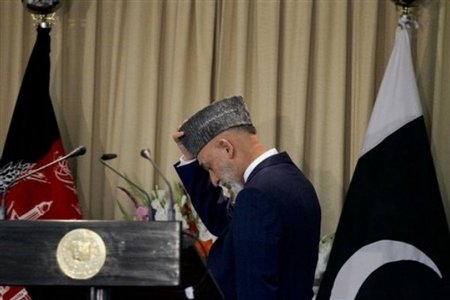
In the coming weeks, President Barak Obama will announce exactly what shape the termination of his Afghan surge will take. In light of this, and in the aftermath of bin Laden's death, pundits have been falling over themselves to voice just what all this means for the future of the U.S. involvement in Afghanistan.
Defense Secretary Gates has called for a gradual withdrawal while Democrats in Congress are eager for a more hasty departure. The White House itself has said that the July drawdown will be "real" and the final decision will be based on "conditions on the ground" lining up with the president's stated objectives of defeating al-Qaeda and stabilizing Afghanistan, according to CFR.org.
Part of the calculus behind any drawdown schedule will be the progress of peace negotiations with the Taliban. Yesterday, The Express Tribune, a Pakistani newspaper affiliated with The International Tribune, ran a story alleging that, according to an unnamed source, the United States had made direct contact with Taliban leader Mullah Omar via an intermediary, a former Taliban spokesman known as Mohammad Hanif who was arrested by U.S. forces in 2007.
Rumors on high-level secret negotiations between the U.S. and the Taliban have been swirling around Kabul for at least a year. Some of this hearsay could be credible, such as talks in Germany, the Persian Gulf and Turkey, while in others instances the U.S. has been outright hoodwinked by Taliban impostors.
According to the Express article, the U.S. had offered the Taliban control over the south of Afghanistan, while leaving the north for the other political forces under American influence. However, this was rejected by the Taliban.
Should this turn out to be true, it would seem the U.S. has taken a page from a recent Foreign Affairs article penned by Robert D. Blackwill, former U.S. ambassador to India and former deputy national security adviser for strategic planning.
In the article Blackwill writes:
Current U.S. policy toward Afghanistan involves spending scores of billions of dollars and suffering several hundred allied deaths annually to prevent the Afghan Taliban from controlling the Afghan Pashtun homeland -- with little end in sight. Those who ask for more time for the existing strategy to succeed often fail to spell out what they think the odds are that it will work in the next few years, what amount of casualties and resources they think the attempt is worth, and why. That calculus suggests that it is time to shift to Plan B....The time has come, therefore, to switch to the least bad alternative -- acceptance of a de facto partition of the country.
Blackwill proposes a long term combat role for as many as 50,000 U.S. troops in the north half of the country, ceding the rest of the country to the Taliban. "...Washington should accept that the Taliban will inevitably control most of the Pashtun south and east and that the price of forestalling that outcome is far too high for the United States to continue paying," argues Blackwill. The former ambassador's proposal amounts to a decade of nation-building in the north and counterterrorism in the south.
If the U.S. is indeed offering to barter half of Afghanistan for a peace treaty, perhaps the Obama administration has reluctantly arrived at the same conclusion as Blackwill: "Accepting a de facto partition of Afghanistan has enough downsides that choosing it makes sense only if the other options available are even worse. They are."
(AP Photo)











